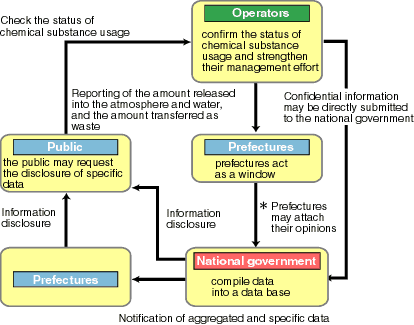
Pollutant
| [PRTR system] |
|
Under the PRTR (Pollution Release and Transfer Register) system, operators keep track of the amount of each chemical substance subjected to PRTR that are released during operational activities, as well as the amount transferred as waste. The results are then reported. This system aims to promote voluntary management efforts by operators together with society as a whole, fostering countermeasures against environmental risks imposed by such chemical substances. Following European and North American countries, the Law Concerning Reporting, etc. of Releases to the Environment of Specific Chemical Substances and Promoting Improvements in Their Management (PRTR Law) was established in Japan in July 1999. Implementation of the law will be followed in fiscal year 2002 by the disclosure of research results compiled by the national government. |
| • PRTR mechanism | ||||||||
 |
||||||||
|
| Under the PRTR Law, operators are required to keep track of the amount of certain released chemical substances from April 2001. However, Kyushu Electric has taken the initiative in investigation and data collection, and the results for fiscal 1999 are shown in the table below. Kyushu Electric is committed to future improvements of its management system. |
| •PRTR investigation results (FY 1999) | |||||||||||||||||||||||
|
| [Dioxins] |
|
Dioxins were subjected to control under the Air Pollution Control Law and "the Waste Disposal and Public Cleaning Law " until the proclamation of the Law Concerning Special Measures against Dioxins in July 1999. In order to curb dioxin emissions as much as possible, Kyushu Electric reduced the use of general waste incinerators and industrial waste incinerators to the greatest extent possible. Kyushu Electric is committed to the appropriate management of incinerators still in use as governed by laws and regulations, including reporting to proper authorities. |
| •Number of Kyushu Electric waste incinerators | ||||||||
|
| [Polychlorinated biphenyl (PCB)] |
|
PCB had been utilized for electric equipment such as transformers because of its excellent heat resistance, insulation and chemical stability, until its toxicity was discovered. In 1972, the manufacturing of PCB was prohibited, and strict storage and management became compulsory for PCB ownership. Kyushu Electric owns some equipment that contains PCB, and exercises utmost care in storing and managing this equipment at special storage places. Currently, Kyushu Electric is examining the possibility of treating such equipment to render it harmless, under the Waste Disposal and Public Cleaning Law. |

|

|



 This mark means acrobat data.
This mark means acrobat data. 

